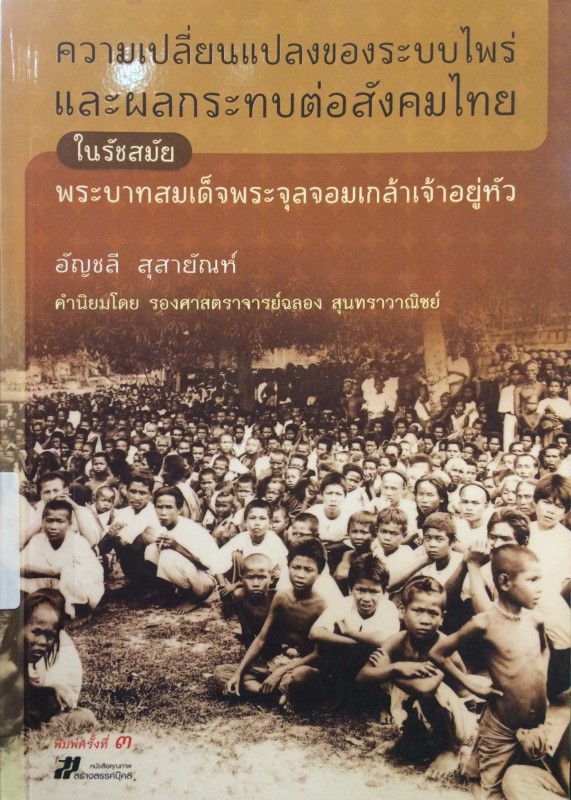
กำลังคนมีค่ามากสำหรับสังคมในอดีต เพราะปัญหาขาดแคลนกำลังคนเกิดขึ้นทั่วไป การควบคุมกำลังคนจึงเป็นสิ่งจำเป็นในการสร้างเสถียรภาพของแต่ละอาณาจักร อาณาจักรต่าง ๆ ของไทย นับแต่ลานนา สุโขทัย อยุธยา จนถึงรัตนโกสินทร์ต่างก็มีระบบไพร่เป็นเครื่องมือในการควบคุม และจัดสรรกำลังคนมาใช้ประโยชน์ ระบบดังกล่าวมีพัฒนาการไปตามสภาวะแวดล้อม และขยายบทบาทจากการควบคุม และเกณฑ์แรงงานคน มาเป็นระบบบริหารราชการที่ทำการปกครอง จัดเก็บผลประโยชน์ของอาณาจักร ตลอดจนกำหนดสถานะของคนในสังคม ระบบไพร่จึงกลายเป็นพื้นฐานของสังคมไทยมานานหลายร้อยปี วิทยานิพนธ์ฉบับนี้มุ่งศึกษาถึงความเปลี่ยนแปลงของระบบไพร่สมัยรัตนโกสินทร์นับแต่ตั้งกรุเทพฯ จนถึงรัชสมัยพระบาทสมเด็จพระจุลจอมเกล้าเจ้าอยู่หัว (พ.ศ.2325 – 2453) และศึกษาผลของความเปลี่ยนแปลงดังกล่าวที่มีต่อสังคมไทย โดยเฉพาะการปรับปรุงประเทศในรัชสมัยพระบาทสมเด็จพระจุลจอมเกล้าเจ้าอยู่หัว การศึกษาในเรื่องนี้จะพิจารณาถึงตัวระบบไพร่ที่ผู้ปกครองพยายามวางกรอบไว้ ปัจจัยที่ผลักดันให้เกิดความเปลี่ยนแปลง ลักษณะของความเปลี่ยนแปลงที่เกิดขึ้น และผลกระทบต่อสังคมไทย นอกจากนี้ยังพิจารณาถึงบทบาท หรือวิธีการที่ผู้ปกครองแก้ปัญหาเรื่องระบบไพร่ ตลอดจนปฏิกิริยาของไพร่ที่มีต่อระบบ ผลของการศึกษาพบว่า ระบบไพร่สมัยรัตนโกสินทร์ไม่สามารถแก้ปัญหาขาดแคลนกำลังคนให้ลุล่วงไปได้ ระบบดังกล่าวประสบปัญหาหลายประการ พระมหากษัตริย์ไม่มีพระราชอำนาจเด็ดขาดดังที่ปรากฏในกฎหมาย ทรงเป็นมูลนายระดับสูงสุดแต่เพียงทางทฤษฎี ในทางปฏิบัติแล้วอำนาจในการควบคุมกำลังคนตกอยู่กับมูลนายระดับรองลงมา คือ เจ้านาย ขุนนาง และข้าราชการ ผลประโยชน์จากไพร่จึงมักจะเป็นของมูลนายเหล่านี้มากกว่าจะเป็นของอาณาจักร นอกจากนี้กฎเกณฑ์ต่าง ๆที่เกี่ยวกับระบบไพร่ก็ถูกละเลย หรือละเมิด มีผลให้ระบบไพร่หละหลวม ไม่สามารถควบคุมกำลังคนได้จริงจัง การแก้ไขปัญหาโดยผ่อนคลายกฎเกณฑ์เพื่อชักชวนให้คนยอมเชื่อฟัง และปฏิบัติตามกฎหมาย ซึ่งสร้างความสับสนมากขึ้น ทำให้เกิดปัญหาติดขัดในการปฏิบัติราชการทุกด้าน และมีส่วนผลักดันให้พระบาทสมเด็จพระจุลจอมเกล้าเจ้าอยู่หัว ทรงเห็นความจำเป็นที่จะต้องปรับปรุงประเทศให้ทันสมัย ด้วยการยกเลิกระบบไพร่ และนำระบบอื่นตามแบบตะวันตกมาใช้เพื่อทำหน้าที่ต่าง ๆ แทนระบบไพร่ต่อไป
Manpower was considered of great importance to society since such a problem as lack of manpower was of general occurrence of the past. Thus the control on manpower was indispensable to the security of each kingdom. The Thai kingdoms, ranging from Lanna, Sukhothai, Ayudhya to Bangkok, all had “the Phrai System” as their implements of manpower management. The system in question, as the product of its environment, developed itself from managing and conscripting manpower to governing the kingdom, reaping benefits and also determining status of people in society. ‘The Phrai System” had therefore become the fundament of Thai society for hundreds of years. This thesis aims at the study of changes in “the Phrai System” of Bangkok period, starting form the foundation of Bangkok in 1782 to the reign of King Chulalongkorn (1868-1910) as well as their consequences on Thai society, especially the reformation in the region of King Chulalongkorn. The system formed by rulers, the factors causing such changes, the way of changing, the rulers’ policy to solve problems concerning this system and phrai’s reaction against the system are all taken into consideration. The study reveals the failure of “the Phrai System” to yield any solutions to the problem of lacking manpower. The system itself had numbers of shortcomings; the king did not obtain absolute power which was discordant to the law. The King, in theory, was considered the supreme patron of the kingdom but in practice princes or nobles took control of manpower. The service of phrai had tendency to render profits to these patrons rather than to the kingdom. Moreover the system became inefficient because of the violation of the rules and regulations, and to persuade people to obey and follow its rules and regulations by means of reducing some of them threw the system into confusion which was of hindrance to the government. The shortcomings of the system in question made King Chulalongkorn aware of the urgent need for modernization by replacing “the Phrai System” with other western systems.
| Author | อัญชลี สุสายัณห์ |
| Published Date | 1981 |
| Place | พิมพ์อัดสำเนา วิทยานิพนธ์ (อ.ม.)--จุฬาลงกรณ์มหาวิทยาลัย, 2524 |
| Subject | history research ไพร่ ไทย -- ประวัติศาสตร์ -- กรุงรัตนโกสินทร์ -- รัชกาลที่ 5 |